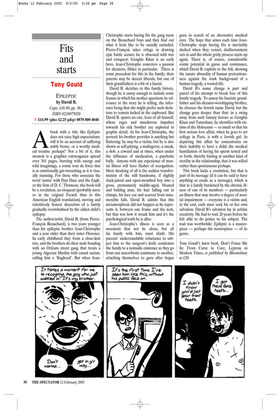Fits and starts
Tony Gould
EPILEPTIC by David B. Cape, £16.99, pp. 361, ISBN 0224075020 ✆ £14.99 (plus £2.25 p&p) 0870 800 4848 Abook with a title like Epileptic does not raise high expectations: will it be an account of suffering nobly borne, or a worthy medical treatise perhaps? Not a bit of it, this memoir is a graphics extravaganza spread over 361 pages, bursting with energy and wild imaginings, a comic tour de force that is as emotionally gut-wrenching as it is visually stunning. For those who associate the word ‘comic’ with Dan Dare and the Eagle, or the firm of D. C. Thomson, this book will be a revelation, an eloquent (probably more so in the original French than in this American English translation), moving and relentlessly honest dissection of a family gradually overwhelmed by the eldest child’s epilepsy.
The author/artist, David B. (born PierreFrançois Beauchard), is two years younger than his epileptic brother Jean-Christophe and a year older than their sister Florence. In early childhood they form a close-knit trio, and the brothers do their male bonding with an Orléans street gang that treats a young Algerian Muslim with casual racism, calling him a ‘Raghead’. But when Jean Christophe starts having fits the gang turns on the Beauchard boys and they find out what it feels like to be socially excluded. Pierre-François takes refuge in drawing epic battle scenes; he is obsessed with war and conquest; Genghis Khan is an early hero. Jean-Christophe conceives a passion for dictators, Hitler in particular. There is some precedent for this in the family; their parents may be decent liberals, but one of their grandfathers is a bit of a fascist.
David B. sketches in this family history, though he is canny enough to include some frames in which his mother questions its relevance to the story he is telling, the inference being that she might prefer such skeletons to remain locked in the cupboard. But David B. spares no one, least of all himself, whose rages and murderous impulses towards his sick brother are explored in graphic detail. As for Jean-Christophe, the portrait his brother provides is anything but flattering: he may be a victim, but he is also shown as self-pitying, a malingerer, a sneak, a slob, a coward and at times, when under the influence of medication, a psychotic bully. Anyone with any experience of mental illness will have flashes of recognition. Most shocking of all is the sudden transformation of the still handsome, if slightly slack-jawed and open-mouthed boy into a gross, prematurely middle-aged, bloated and balding man, his hair falling out in clumps, his face cut and scarred from innumerable falls. David B. admits that this metamorphosis did not happen as he represents it, between one frame and the next, but that was how it struck him and it’s the psychological truth he is after.
Jean-Christophe’s illness is seen as a mountain that not he alone, but all his family with him, must climb. His parents’ understandable reluctance to subject him to the surgeon’s knife condemns the family to a nomadic existence as they go from one macrobiotic commune to another, attaching themselves to guru after bogus guru in search of an alternative medical cure. The hope that arises each time JeanChristophe stops having fits is inevitably dashed when they restart; disillusionment sets in and the whole grisly process starts up again. There is, of course, considerable comic potential in gurus and communes, which David B. exploits to the full, showing the innate absurdity of human pretentiousness against the stark background of a human tragedy, a wasted life.
David B’s name change is part and parcel of his attempt to break free of this family tragedy. To annoy his fascistic grandfather and his dictator-worshipping brother, he chooses the Jewish name David, but the change goes deeper than that: in a swing away from such fantasy heroes as Genghis Khan and Tamerlane, he identifies with victims of the Holocaust — so much so that his first serious love affair, when he goes to art college in Paris, is with a Jewish girl. In depicting this affair he concentrates on their inability to have a child, the medical humiliation of having his sperm tested and so forth, thereby hinting at another kind of sterility in the relationship, that it was willed rather than spontaneous perhaps.
This book lacks a resolution, but that is part of its message (if it can be said to have anything so crude as a message), which is that in a family burdened by the chronic illness of one of its members — particularly an illness that may involve a degree of mental impairment — everyone is a victim and, in the end, each must seek his or her own salvation. David B’s salvation lay in artistic creativity. He had to wait 20 years before he felt able to do justice to his subject. The wait was worthwhile: Epileptic is a masterpiece — perhaps the masterpiece — of its genre.













































 Previous page
Previous page